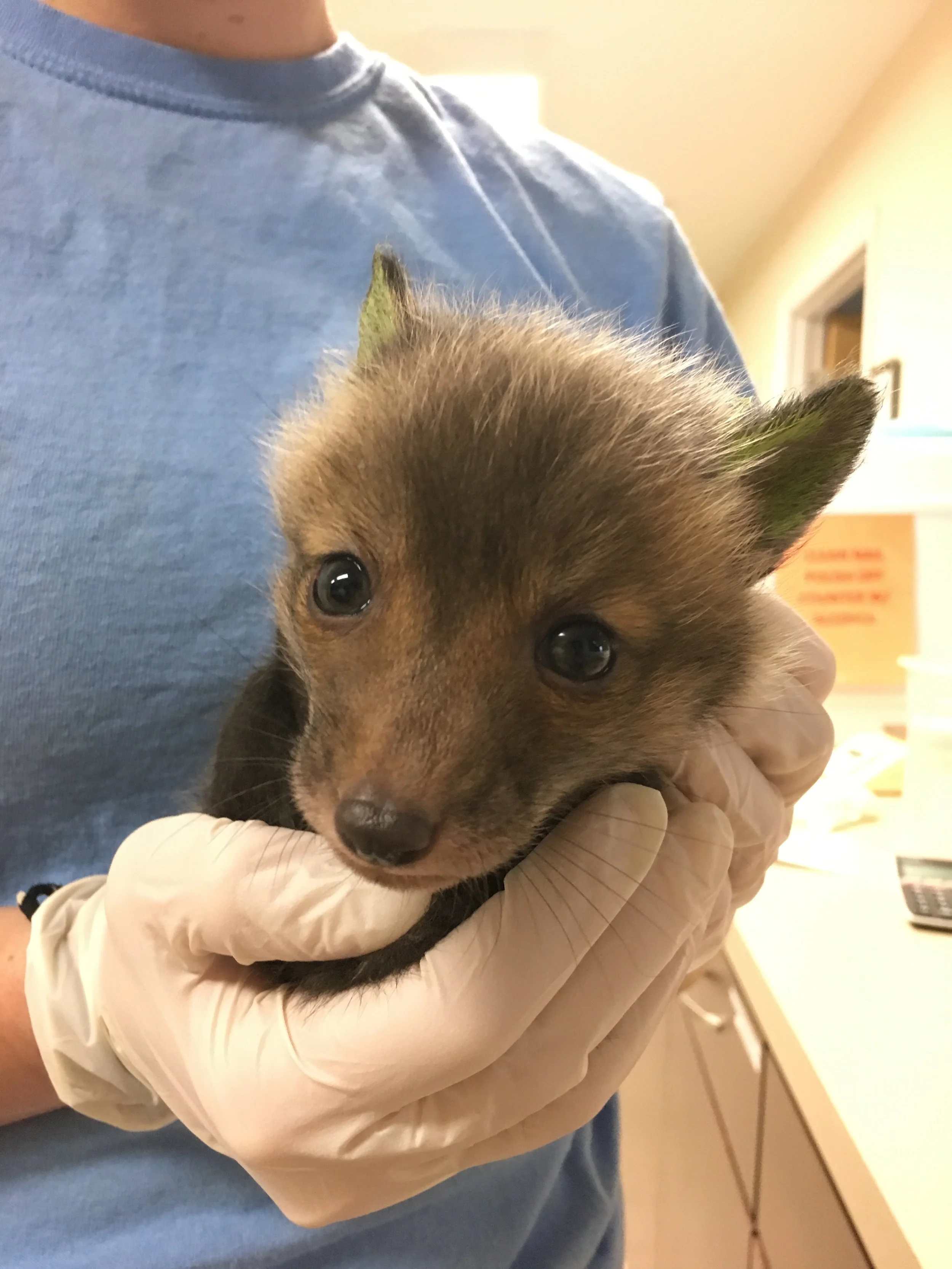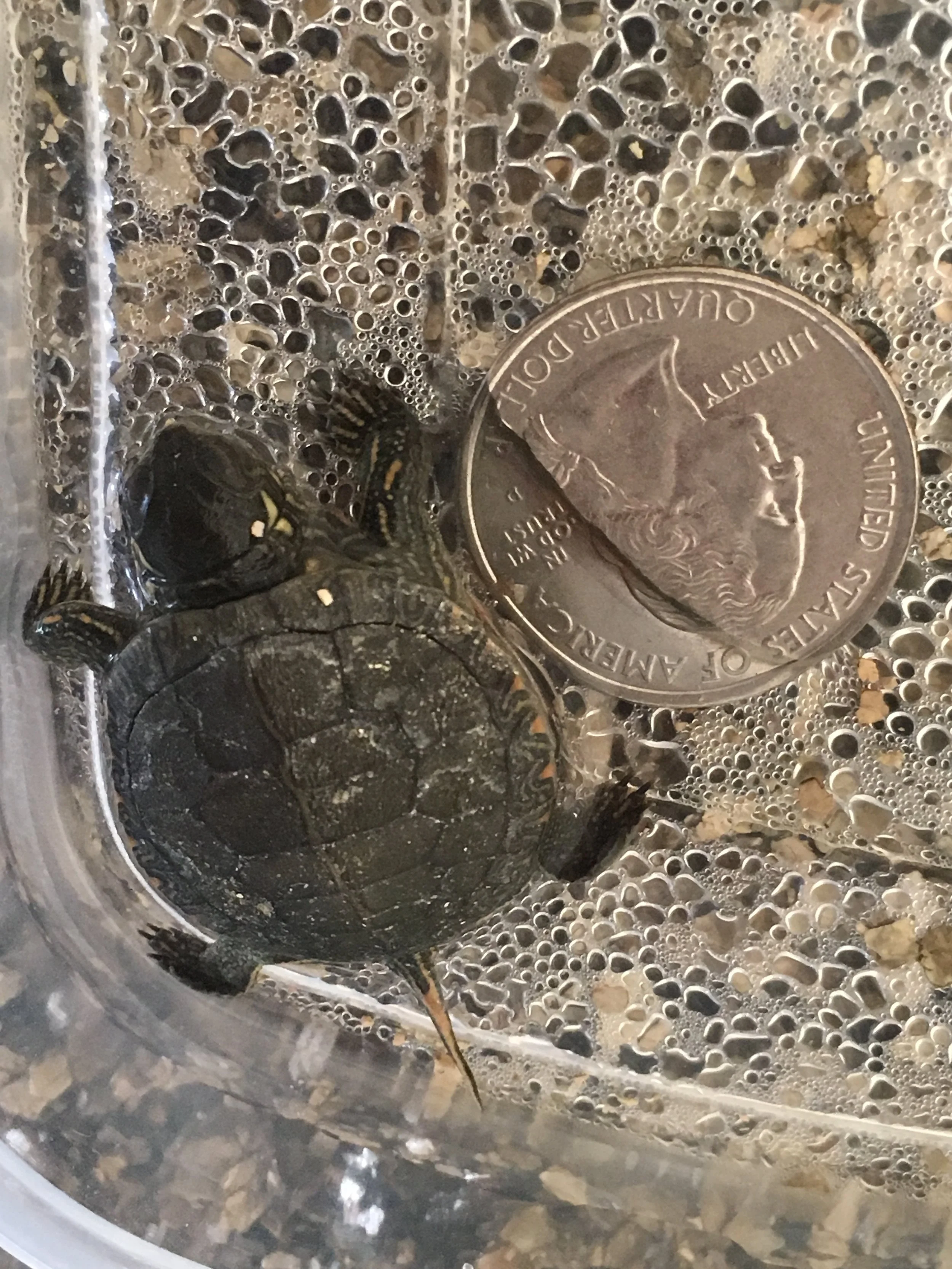Have you found a wild animal in need of assistance?
Observe the situation from a distance. Are there any obvious injuries or bleeding?
Note the location (exact street address/location landmarks, if possible).
CALL a professional: Blue Ridge Wildlife Center at 540-837-9000, a licensed wildlife rehabilitator, or your local animal control.
Regardless of species, do not touch the animal directly (wear gloves, use towels, etc. to prevent injuries and the spread of disease).
Keep the animal in a dark and quiet location.
Do not offer food or water – especially for babies.
Blue Ridge Wildlife Center is open between 9AM - 5PM
For after-hours emergencies please see below. Our Frequently Asked Questions may also address your emergency.
You may also want to consult with a licensed wildlife rehabilitator near you.
What type of animal did you find?
Birds
Baby: Follow the steps in this flow chart. If it is already dark, keep the bird in a dark, quiet, and warm area with NO food or water. Attempt reuniting as soon as the sun comes up. Call the Center in the morning with any questions.
Adult: Adult songbirds can be quite fragile. Use a hand towel (or butterfly net) to gently contain the bird in a cardboard box. Keep the bird in a warm, dark, quiet area until a rehabilitator is reached. Do not offer food or water. Recommendations for birds recovering from window collisions were once to test fly the bird after a few hours. Studies now show that any bird known to have collided with a window be evaluated by a rehabilitator. Cat attacked birds should also always be evaluated by a rehabilitator even if you see no obvious punctures and the bird appears to have recovered after a few hours. Call the Center in the morning with any questions.
This young cottontail fits in the palm of an average-sized hand - yet it is old enough to be on its own!
Bunnies
Baby: Follow the steps in this flow chart. Call the Center in the morning with any questions.
Adult: Scoop the rabbit into a box without direct contact and keep the animal in a warm, dark, quiet area until a rehabilitator is reached. Do not offer food or water.
Easter Gray Squirrel babies being rehabilitated after mother was killed.
Squirrel
Baby: Follow the steps in this flow chart. If it is already dark, keep the squirrel in a dark, quiet, and warm area with NO food or water. Attempt reuniting as soon as the sun comes up. Call the Center in the morning with any questions.
Adult: Adult squirrels can be very dangerous due to their large incisors and sharp nails. Never handle directly. If the squirrel is weak enough that you can use a rake, shovel, towel, or other item to scoop the squirrel into a box (ideally plastic as they can chew through cardboard more quickly) and keep the animal in a warm, dark, quiet area until a rehabilitator is reached. Do not offer food or water.
Opossums
Virginia Opossums breed from February through September in our area. They move into their mother’s pouch after just 13 days of gestation and remain there for approximately two months. Unlike many other native species, mother opossums rarely return for lost babies, so leaving them out to reunite is not advised. If you find an opossum that is less than 7” from nose to tail base, that individual is likely too young to survive on its own and a rehabilitator should be contacted.
Most orphaned opossums are found in the pouch of mothers that have been killed in vehicle collisions. Do not rip babies off the mother (the entire body can be placed in a box with babies latched and brought to a rehabilitator). Opossums may have more than nine babies in some cases, so if older babies are seen wandering near a dead mother, take a good look around the surrounding area to ensure all babies have been recovered. If an injured mother is found, be sure to collect all nearby babies and bring them into rehab with their mother.
A family of young opposums admitted after mother died in a car collision.
Raccoons, foxes, skunks, bats, and other high-risk rabies vector species should NOT be handled, including babies! Even newborn babies can transmit rabies. It is best to leave nocturnal baby animals out overnight so that mom can return while she is active and bring them back to a nest site. If you believe one of these animals is injured or orphaned, contact a permitted rehabilitator and/or your local animal control right away.
If safe, you can cover such babies with a cardboard box or crate to keep them contained until you hear back from a rehabilitator or officer with further advice. Keep children and pets away until you get help.
Young Red Fox.
This Eastern Painted Turtle baby has all the skills it needs to survive on its own after hatching.
Reptiles and Amphibians
Reptiles and amphibians are on their own from birth! Most of these parents, who are typically egg-laying, disperse after they have laid their eggs. Please do not attempt to raise hatchling turtles or tadpoles and never relocate these (or any) wildlife as disease spread can potentially devastate an entire population.
If a turtle is found in the road, only intervene if it is safe to do so. If you do intervene, check both the carapace (upper shell) and the plastron (underside) for injuries. If uninjured, never move that animal further than the other side of the road in the direction it was already travelling.
If you have concerns about a young reptile or amphibian, please contact the Center.
Non-Wildlife or Domestic Pets
BRWC only provides veterinary care for wildlife. If you have lost or found a dog, cat, or other domestic or exotic animal, or are looking to adopt, please contact one of the agencies below for more information. Some of these organizations also take calls regarding wildlife — those are noted with “Wildlife” in parenthesis.
CLARKE AND FREDERICK COUNTY
FAUQUIER COUNTY
FREDERICK COUNTY
Loudoun County
Warren County
Shenandoah County
Shenandoah County Animal Shelter (Wildlife)
Shenandoah County Sheriff’s Office (Wildlife)
Virginia Department of Game and Inland Fisheries
Wildlife Conflict helpline at 1-855-571-9003
List of Licensed Wildlife Rehabilitator






